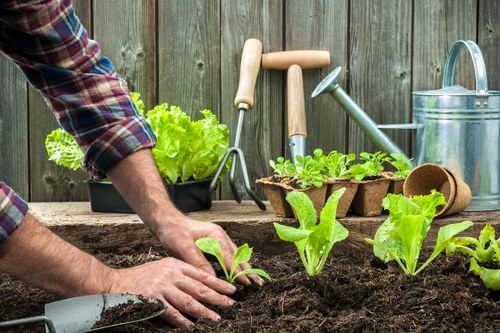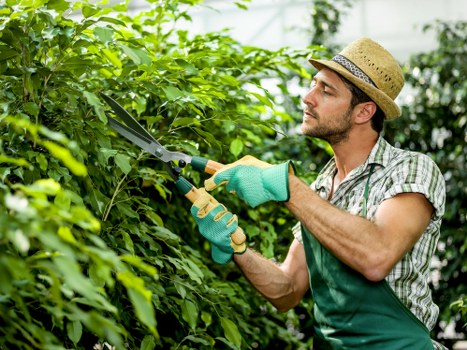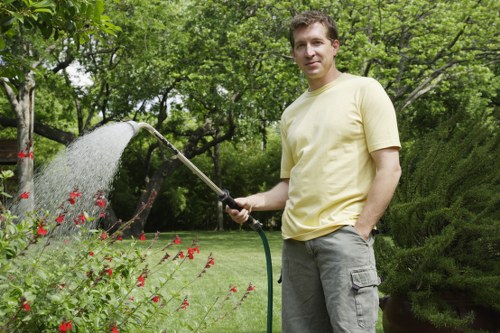Garden Maintenance in Hunters Hill

Introduction to Garden Maintenance
Maintaining a beautiful garden in Hunters Hill requires dedication, knowledge, and the right techniques. Whether you're a seasoned gardener or a beginner, understanding the fundamentals of garden maintenance is essential for creating a thriving outdoor space.
In Hunters Hill, the climate and soil conditions play a significant role in determining the best practices for garden upkeep. This article delves into the various aspects of garden maintenance, offering tips and strategies tailored to the unique environment of Hunters Hill.
From seasonal planting to pest control, effective garden maintenance ensures that your greenery remains vibrant and healthy throughout the year.

Essential Garden Maintenance Tasks
1. Regular Weeding
Weeds compete with your plants for nutrients, water, and sunlight. Regular weeding is crucial to maintain the health of your garden. In Hunters Hill, where certain weed species are prevalent, staying on top of this task can significantly enhance your garden's appearance.
Use hand tools or weeding devices to remove unwanted plants, ensuring you get the roots to prevent regrowth. Mulching can also be an effective strategy to suppress weed growth.
Tip: Weeding is most effective after rainfall when the soil is moist, making it easier to pull out weeds entirely.

2. Pruning and Trimming
Pruning helps maintain the shape of your plants and encourages healthy growth. Regular trimming removes dead or diseased branches, allowing your plants to thrive. In Hunters Hill, pruning at the right time of year is essential to avoid damaging your plants.
For flowering plants, prune after the blooming season to encourage more blooms the following year. For evergreens, light pruning in early spring can promote a fuller appearance.
Remember: Always use clean, sharp tools to make precise cuts and prevent infections.

Seasonal Garden Care
Spring Maintenance
Spring is a crucial time for setting up your garden for success. Begin by clearing away any debris from winter and preparing the soil for planting. Fertilizing early in the season provides essential nutrients for your plants as they start to grow.
Planting annuals and perennials should be done in spring to take advantage of the growing season. Additionally, it's an ideal time to install supports for tall plants and set up any necessary irrigation systems.
Pro Tip: Incorporate a variety of plants to ensure a colorful and diverse garden throughout the year.

Summer Maintenance
During the summer months, attention shifts to watering and managing heat stress. Consistent watering, preferably in the early morning or late evening, helps your plants retain moisture. Mulching around plants can also conserve water and regulate soil temperature.
Keep an eye out for pests that thrive in warmer weather. Implementing natural pest control methods can protect your garden without harming beneficial insects.
Hydration is key: Ensure your garden receives adequate water to prevent wilting and sunburn on plants.

3. Soil Health and Fertilization
Healthy soil is the foundation of a flourishing garden. Regular testing of your soil's pH and nutrient levels helps determine what amendments are needed. In Hunters Hill, soil composition can vary, so tailor your fertilization approach accordingly.
Organic fertilizers and compost enrich the soil, promoting strong root growth and vibrant plant life. Avoid over-fertilizing, as this can lead to nutrient imbalance and plant stress.
Suggestion: Incorporate cover crops or green manure in off-seasons to maintain soil fertility.

4. Pest and Disease Management
Pests and diseases can quickly deteriorate your garden's health. Regular monitoring allows for early detection and treatment. In Hunters Hill, common garden pests include aphids, snails, and caterpillars.
Implement integrated pest management (IPM) techniques, such as introducing beneficial insects, using organic pesticides, and maintaining plant diversity to reduce pest prevalence.
Preventative measures: Regularly inspect plants and maintain cleanliness in your garden to deter pests and diseases.

5. Lawn Care
A well-maintained lawn enhances the overall appeal of your garden. In Hunters Hill, proper mowing, aeration, and watering are essential for a lush, green lawn.
Mow your lawn to the appropriate height for your grass type, typically around 2.5 to 3 inches. Aerate the soil annually to improve water and nutrient absorption.
Tip: Overseeding bare spots in the lawn helps maintain density and prevents weed invasion.

Choosing the Right Plants
Selecting plants that are well-suited to the Hunters Hill climate ensures easier maintenance and better growth. Native plants often require less water and are more resistant to local pests and diseases.
Incorporate a mix of evergreen and deciduous plants to maintain year-round interest. Consider flowering plants that attract pollinators, enhancing your garden's ecosystem.
Remember: Group plants with similar water and light requirements together to streamline your maintenance efforts.

6. Irrigation Systems
Efficient watering systems are vital for maintaining a healthy garden, especially during dry spells. Drip irrigation and soaker hoses deliver water directly to the plant roots, minimizing evaporation and water waste.
Automated irrigation systems with timers can ensure consistent watering schedules, saving you time and effort. Regularly check and maintain your irrigation system to prevent leaks and ensure optimal performance.
Pro Tip: Collecting rainwater in barrels can be an eco-friendly way to supplement your garden's water supply.

Local Gardening Services
For those who prefer professional assistance, numerous gardening services in Hunters Hill cater to various maintenance needs. From routine lawn care to specialized plant care, hiring experts can help achieve the garden of your dreams.
These services often offer customized maintenance plans, taking into account the specific requirements of your garden and your personal preferences. Whether it's regular mowing, fertilizing, or pest control, professional gardeners ensure your outdoor space remains pristine.
Consider: Scheduling seasonal maintenance to address the changing needs of your garden throughout the year.

7. Sustainable Gardening Practices
Embracing sustainable practices not only benefits the environment but also enhances the health of your garden. Techniques such as composting, rainwater harvesting, and using organic fertilizers reduce your garden's ecological footprint.
Additionally, selecting drought-resistant plants minimizes water usage, making your garden more resilient during dry periods typical in Hunters Hill.
Benefit: Sustainable gardens often require less maintenance and are more self-sufficient, saving you time and resources in the long run.

Tools and Equipment for Garden Maintenance
Having the right tools is essential for efficient garden maintenance. Basic tools include a sturdy shovel, pruning shears, a watering can or hose, and a rake. Investing in quality equipment ensures durability and ease of use.
For larger gardens, power tools such as lawnmowers, string trimmers, and hedge cutters can significantly reduce the time and effort required for upkeep.
Safety first: Always wear appropriate protective gear and follow manufacturer instructions when using garden tools and equipment.

8. Creating a Maintenance Schedule
Organizing your garden maintenance tasks with a schedule helps ensure nothing is overlooked. A well-planned schedule accounts for seasonal changes and specific plant needs.
Consider creating a monthly checklist that includes tasks such as fertilizing, pruning, weeding, and inspecting for pests. This systematic approach promotes consistency and keeps your garden in top condition.
Tip: Utilize gardening apps or calendars to track and remind you of upcoming maintenance activities.

9. Enhancing Garden Aesthetics
Beyond basic maintenance, enhancing the aesthetic appeal of your garden can create a more inviting and enjoyable outdoor space. Incorporate elements such as decorative pathways, garden ornaments, and lighting to add character.
Strategic plant placement and the use of color schemes can also elevate the visual impact of your garden. Consider incorporating native plants and seasonal blooms to maintain interest throughout the year.
Get creative: Personalize your garden with DIY projects or unique plant arrangements that reflect your style.

10. Dealing with Common Garden Challenges
Managing Pests
Pest infestations can pose a significant threat to your garden's health. Common pests in Hunters Hill include aphids, caterpillars, and snails. Timely identification and intervention are crucial to prevent widespread damage.
Implementing natural pest control methods, such as introducing beneficial insects like ladybugs or using neem oil, can effectively manage pest populations without harming your plants.
Pro Tip: Regularly inspect your plants for signs of pests and act promptly at the first indication of an infestation.

Preventing Plant Diseases
Plant diseases, often caused by fungi, bacteria, or viruses, can weaken or kill your plants if left unchecked. Proper spacing, adequate watering, and good air circulation are preventive measures that reduce the risk of disease.
Remove and dispose of infected plant parts immediately to prevent the spread. Using disease-resistant plant varieties can also enhance your garden's resilience against common ailments.
Stay vigilant: Regular monitoring and prompt action are key to maintaining a healthy garden free from diseases.

Soil Erosion Control
Soil erosion can undermine the stability and fertility of your garden. In areas with heavy rainfall or wind, erosion is a common challenge. Implementing ground covers, terracing, and proper drainage systems can mitigate erosion risks.
Planting deep-rooted plants helps anchor the soil, while mulch applications create a protective layer that reduces runoff and soil displacement.
Solution: Regularly assess your garden for signs of erosion and reinforce vulnerable areas promptly.

10. Sustainable Garden Practices
Adopting sustainable gardening practices not only benefits the environment but also ensures the long-term health of your garden. Techniques such as composting organic waste, using rainwater harvesting systems, and selecting drought-resistant plants contribute to a more eco-friendly garden.
In Hunters Hill, where water conservation is essential, integrating these practices can lead to significant savings and a more resilient garden ecosystem.
Eco-friendly tip: Start a compost bin to recycle kitchen scraps and yard waste, providing rich nutrients for your plants.

11. Attracting Beneficial Wildlife
Encouraging beneficial wildlife, such as pollinators and predatory insects, enhances your garden's health and productivity. Bees, butterflies, and birds play a crucial role in pollination and natural pest control.
Planting a variety of nectar-rich flowers and providing habitat features like birdhouses and insect hotels attract these helpful creatures to your garden.
Benefit: A garden teeming with beneficial wildlife fosters a balanced ecosystem and reduces the need for chemical interventions.

Local Gardening Regulations
Understanding and adhering to local gardening regulations in Hunters Hill ensures that your maintenance practices are compliant and environmentally responsible. These regulations may pertain to water usage, pesticide application, and waste disposal.
Familiarize yourself with the Hunters Hill council guidelines to avoid potential fines and contribute to the community's sustainability efforts.
Stay informed: Regularly check for updates on local gardening ordinances and best practices.

12. DIY vs. Professional Maintenance
Deciding between DIY garden maintenance and hiring professionals depends on various factors, including the size of your garden, your expertise, and the time you can dedicate.
While DIY maintenance can be rewarding and cost-effective, professional gardeners offer expertise, efficiency, and the ability to handle more complex tasks. Assess your needs and resources to determine the best approach for your garden care.
Consider: Combining DIY efforts with periodic professional services for optimal results.

Maintaining Garden Pathways and Structures
Pathways, fences, and other garden structures contribute to the functionality and aesthetics of your outdoor space. Regular maintenance ensures these elements remain safe and visually appealing.
For pathways, consider re-leveling or replacing worn-out pavers to prevent tripping hazards. Wooden fences may require sanding and sealing to protect against weather damage.
Enhancement tip: Adding lighting to pathways and structures can extend the usability of your garden into the evening hours.

Top 15 Nearby Areas to Hunters Hill for Garden Maintenance Services
- Petersham: Just south of Hunters Hill, Petersham offers lush parks and a community keen on sustainable gardening.
- Gladesville: Known for its picturesque waterfront gardens, Gladesville is a hub for garden enthusiasts.
- Riverside: Riverside boasts a variety of nurseries and garden centers catering to local gardeners.
- Ryde: Ryde's expansive green spaces make it an excellent area for garden maintenance services.
- Gladesville: Adjacent to Hunters Hill, Gladesville offers beautiful gardens and a strong gardening community.
- Ermington: Ermington's residential areas often require professional garden upkeep, making it a key area for services.
- Victoria Park: With its well-maintained public gardens, Victoria Park is a prime location for garden maintenance experts.
- Ryde: Ryde's diverse plantings and large gardens necessitate specialized maintenance services.
- Gladesville: This area is renowned for its community gardens and active gardening participation.
- West Ryde: West Ryde's suburban gardens benefit from regular maintenance to preserve their beauty.
- Pyrmont: While more urban, Pyrmont still hosts numerous private gardens that require upkeep.
- Homebush: Homebush's expansive properties often seek professional garden maintenance services.
- St Leonards: St Leonards blends urban living with garden spaces that need regular care.
- Lane Cove: Lane Cove's residential gardens are well-suited for professional maintenance services.
- North Strathfield: North Strathfield's community-focused gardens often engage local maintenance professionals.

Conclusion
Effective garden maintenance in Hunters Hill involves a combination of regular care, proper planning, and the right techniques. By understanding the unique environmental factors and implementing best practices, you can cultivate a beautiful and thriving garden.
Whether you choose to maintain your garden yourself or enlist professional help, the key is consistency and attention to detail. Embrace sustainable practices and stay informed about local gardening trends to enhance your outdoor space year-round.
Ready to transform your garden? Contact us today and let our team of experts help you achieve the garden of your dreams in Hunters Hill.
Get Started with Your Garden Maintenance
Don't wait to give your garden the care it deserves. Book your service now and enjoy a lush, vibrant outdoor space throughout the seasons.
Connect with Local Experts
Our team is dedicated to providing top-notch garden maintenance services tailored to the Hunters Hill community. Reach out today to schedule a consultation and discover how we can make your garden flourish.
Enhance Your Garden's Beauty: From planting to pruning, our comprehensive services cover all aspects of garden maintenance.
